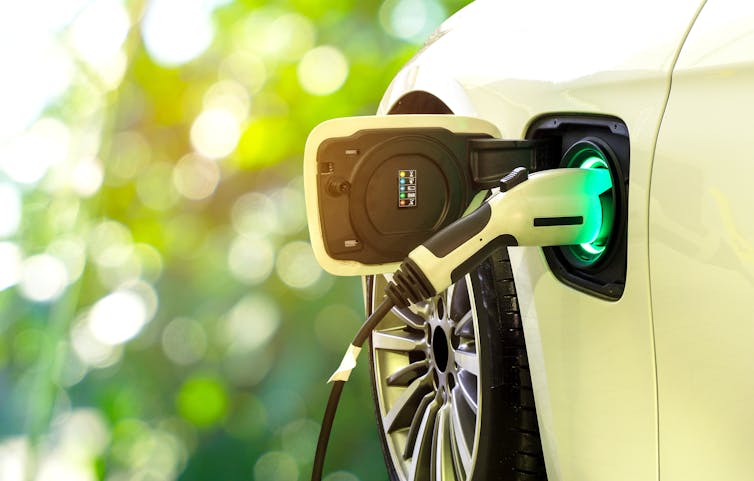Electric cars can clean up the mining industry – here's how
- Written by Elsa Dominish, Senior Research Consultant, Institute for Sustainable Futures, University of Technology Sydney
Growing demand for electric vehicles is important to help cut transport emissions, but it will also lead to new mining. Without a careful approach, we could create new environmental damage while trying to solve an environmental problem.
Like solar panels, wind turbines and battery storage technologies, electric vehicles require a complex mix of metals, many of which have only been previously mined in small amounts.
These include cobalt, nickel and lithium for batteries used for electric vehicles and storage; rare earth metals for permanent magnets in electric vehicles and some wind turbines; and silver for solar panels.
Read more: Time for a global agreement on minerals to fuel the clean energy transition
Our new research at the Institute of Sustainable Futures found that under a 100% renewable energy scenario, demand for metals for electric vehicles and renewable energy technologies could exceed reserves for cobalt, lithium and nickel.
To ensure the transition to renewables does not increase the already significant environmental and human impacts of mining, greater rates of recycling and responsible sourcing are essential.
 Greater uptake of electric vehicles will translate to more mining of metals such as cobalt.
Shutterstock
Greater uptake of electric vehicles will translate to more mining of metals such as cobalt.
Shutterstock
Recycling can offset demand for new mining
Electric vehicles are only a very small share of the global vehicle market, but their uptake is expected to accelerate rapidly as costs reduce. This global shift is the main driver of demand for lithium, cobalt and rare earths, which all have a big effect on the environment.
Read more: Politically charged: do you know where your batteries come from?
Although electric vehicles clearly help us by reducing transport emissions, the electric vehicle and battery industries face the urgent challenge of improving the environmental effects of their supply chains.
Our research shows recycling metals can significantly reduce primary demand for electric vehicle batteries. If 90% of cobalt from electric vehicle and energy storage batteries was recycled, for instance, the cumulative demand for cobalt would reduce by half by 2050.
So what happens to the supply when recycling can’t fully meet the demand? New mining is inevitable, particularly in the short term.
In fact, we are already seeing new mines linked to the increasing demand for renewable technologies.
Clean energy is not so clean
Without responsible management, greater clean energy uptake has the potential to create new environmental and social problems. Heavy metals, for instance, could contaminate water and agricultural soils, leading to health issues for surrounding communities and workers.
Read more: Dirty deeds: how to stop Australian miners abroad being linked to death and destruction
Most of the world’s cobalt is mined in the Democratic Republic of Congo, and around 20% of this is from artisanal and small-scale miners who work in dangerous conditions in hand-dug mines.
This includes an estimated 40,000 children under 15.
Rare earths processing requires large amounts of harmful chemicals and produces large volumes of solid waste, gas and wastewater, which have contaminated villages in China.
Copper mining has led to pollution of large areas through tailings dam failures, including in the US and Canada. A tailings dam is typically an earth-filled embankment dam used to store mining byproducts.
 A tailings dam.
Edvision/Shutterstock
A tailings dam.
Edvision/Shutterstock
When supply cannot be met by recycling, we argue companies should responsibly source these metals through verified certification schemes, such as the IRMA Standard for Responsible Mining.
What would a sustainable electric vehicle system look like?
A sustainable renewable energy and transport system would focus on improving practices for recycling and responsible sourcing.
Many electric vehicle and battery manufacturers have been proactively establishing recycling initiatives and investigating new options, such as reusing electric vehicle batteries as energy storage once they are no longer efficient enough for vehicles.
Read more: Treasure from trash: how mining waste can be mined a second time
But there is still potential to improve recycling rates. Not all types of metals are currently being recovered in the recycling process. For example, often only higher value cobalt and nickel are recovered, whereas lithium and manganese are not.
And while electric vehicle manufacturers are beginning to engage in responsible sourcing, many are concerned about the ability to secure enough supply from responsibly sourced mines.
If the auto industry makes public commitments to responsible sourcing, it will have a flow-on effect. More mines would be encouraged to engage with responsible practices and certification schemes.
These responsible sourcing practices need to ensure they do not lead to unintended negative consequences, such as increasing poverty, by avoiding sourcing from countries with poorer governance.
Focusing on supporting responsible operations in these countries will have a better long-term impact than avoiding those nations altogether.
What does this mean for Australia?
The Australian government has committed to supporting industry in better managing batteries and solar panels at the end of their life.
But stronger policies will be needed to ensure reuse and recycling if the industry does not establish effective schemes on their own, and quickly.
Australia is already the largest supplier of lithium, but most of this is exported unprocessed to China. However, this may change as the battery industry expands.
Read more: Charging ahead: how Australia is innovating in battery technology
For example, lithium processing facilities are under development in Western Australia. Mining company Lithium Australia already own a battery component manufacturer in Australia, and recently announced they acquired significant shares in battery recycling company Envirostream.
This could help to close the loop on battery materials and create more employment within the sector.
Human rights must not be sidelined
The renewable energy transition will only be sustainable if human rights are made a top priority in the communities where mining takes place and along the supply chain.
The makers of electric cars have the opportunity to lead these industries, driving change up the supply chain, and influence their suppliers to adopt responsible practices.
Governments and industry must also urgently invest in recycling and reuse schemes to ensure the valuable metals used in these technologies are recovered, so only what is necessary is mined.
Authors: Elsa Dominish, Senior Research Consultant, Institute for Sustainable Futures, University of Technology Sydney
Read more http://theconversation.com/electric-cars-can-clean-up-the-mining-industry-heres-how-115369





